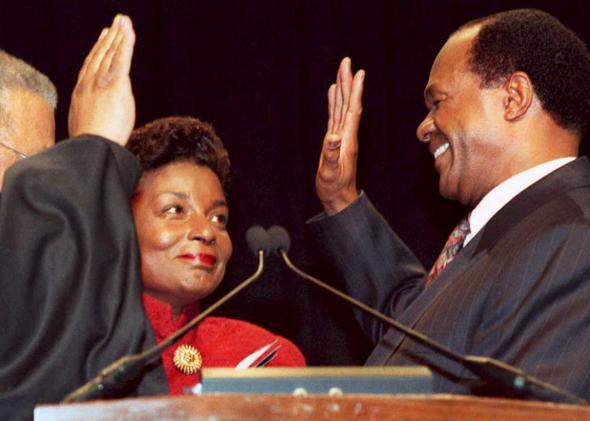Marion Barry was a chemist. This was rarely noted, except around the time of his 1990 drug arrest, when critics liked to make wry comments about how expertly he handled crack cocaine. But Barry had earned a master’s in chemistry at Fisk University, and started a chemistry doctorate at the University of Tennessee—the only black student in both programs. When Barry became the first chairman of the Student Nonviolent Coordinating Committee, he was a student of chemistry.
The always and forever Mayor of Washington died on Sunday at age 78. Of course let us revel in the comic opera of crimes and near crimes. The tax evasion! The unpaid tickets! The various girlfriend scams! Ivanhoe Donaldson! Of course let us deplore the nasty racial grandstanding that defined the back half of his career. But it is chemistry that is the key to understanding Barry. He understood politics as a series of carefully calibrated reactions designed to produce a particular outcome. That outcome was always the same: electoral victory for Marion Barry.
Because he emerged from the civil rights movement—and because he had such a deep, hard family history—early Barry confederates tended to attribute to him the idealism of the movement, or at least the passion of it. When he moved to Washington, D.C., in the 1960s, he enraptured young liberals—both black and white—with his apparent fervor for liberating the city from colonial oppression. He led protests. He wore dashikis.
But Barry had an essentially analytical relationship with his adopted city. I wrote my college thesis about Barry, and interviewed tons of people who met him in the 1970s as he built his political career. To a person, they talked about Barry’s obsession with the numbers—understanding voting and political relationships at a block-by-block level. He was looking to add those numbers up in a way that produced Election Day wins for himself.
Barry won his first citywide election in 1971, earning a position on the D.C. school board. Three years later, he moved up to a spot on the D.C. council. In 1978, in his first run for mayor, he faced two admired, respected politicians of D.C.’s black establishment in the Democratic primary. The chemist pulled together a coalition of young white progressives, young blacks, and D.C.’s tiny number of Asians and Hispanics and gays, and snatched a plurality victory.
Once in office, he ditched that multiracial goo-goo coalition, as it was only sufficient to win a split Democratic primary, not to control the city. He looked at the numbers, and devised a new formula, adapting the machine politics practiced a generation earlier by Irish and Italian mayors. What better way to lock in a loyal voting base than with jobs? By Barry’s second term, D.C. had by far the largest city government in the United States per capita. He coupled a permanent bureaucracy with a massive summer jobs program for kids. When I interviewed Washingtonians in the 1990s about why they were still voting for Marion Barry, an astonishing number cited the summer job he gave them back in the 1970s.
When everything started to fall apart in the late 1980s—the corruption and the booze and the drugs—Barry’s chemical approach remained. He was caught red-handed smoking crack. To defend himself, he was willing to impugn the entire system of justice, successfully convincing several jurors not to convict him of most charges—despite overwhelming evidence—because of a biased prosecution. This was a huge triumph for Barry, but the rest of the city—and the justice system—paid the price for his cynical defense.
It was time for another formula. White voters were lost to him. So were most middle-class black voters. So Barry moved to the poorest region of the city, Ward 8, and helped himself to a seat on the D.C. council. His ambitions got smaller, but his particular expertise never changed. He ensconced himself in that Ward 8 council seat for the last 10 years of his life. He was ugly—ranting about Asian-American business owners and their “dirty shops,” and cynically opposing gay marriage, a cause he had supported decades earlier—but he protected his turf. Here is the greatest tribute possible to Marion Barry: By my count, he ran in 19 elections over four decades, facing vastly different electorates and vastly different circumstances, and he lost only once—and that single defeat came just a few weeks after he had been sentenced to federal prison.
Marion Barry won the prize of city government at the moment that cities began to slide, and before their recent revival. As a result, he left few tangible accomplishments. He inflicted on my city a bureaucracy that was too big, a mediocre police department, and horrid schools. Since the end of Barry’s ridiculous fourth mayoral term in January 1999, D.C.’s politicians have run away from him. Our mayoral candidates are competent, dreary, and technocratic. Unlike Barry, they seem more interested in governing their city than serving themselves. Marion Barry loomed over D.C. politics for 43 years, but there is no Barryism.
